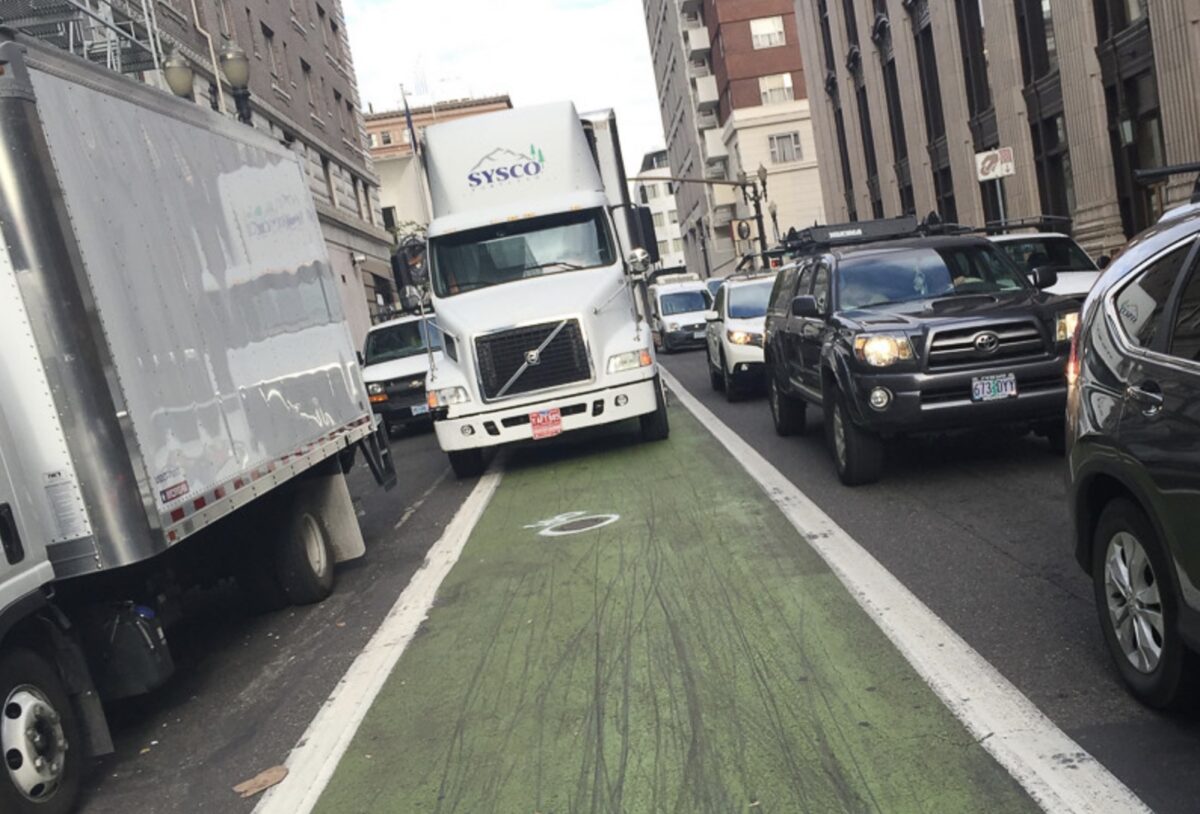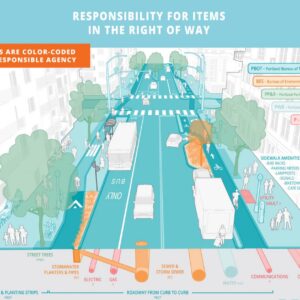
The Portland Bureau of Transportation (PBOT) is seeking $2 million from the federal government to look into ways to reduce greenhouse gas emissions from the freight industry, and the results could be helpful for more than just transportation decarbonization goals.
This comes at a time when freight truck reform has the spotlight from many Portland transportation advocates, who are questioning the influence the freight lobby has on active transportation policies locally and statewide. An infusion of federal money could help propel advocates to rethink the future of the city’s trucking industry and look into zero-emissions, multimodal freight options to mitigate freight’s safety and climate impacts.
This freight program is one of two transportation decarbonization projects PBOT wants to receive federal funding for. The other one (which City Council spent the majority of its time discussing last week) is intended to help the city develop a pole-mounted electric car charging network in the right of way.
The freight decarbonization project is more novel for PBOT. This grant is managed through the U.S. Department of Transportation’s Strengthening Mobility and Revolutionizing Transportation (SMART) program, which is included in the Infrastructure Investments and Jobs Act (IIJA) and for projects “focused on advanced smart city or community technologies and systems in a variety of communities to improve transportation efficiency and safety.”
This grant application goes along with the community response to Portland’s freight system, which PBOT has sought out as they plan the 2040 Freight Plan, an update of the Freight Master Plan adopted in 2006. This plan is intended to guide PBOT’s strategy to support “safe, equitable, efficient, and sustainable urban freight movement in Portland.”
In July, PBOT released a report outlining what planners found during an outreach process for the 2040 Freight Plan. They went to various advisory committees, like the bicycle and pedestrian advisory committees, and issued a survey for public input.
According to that report, members of the advisory groups and the public alike agree that the freight industry’s environmental and safety impacts are the most pressing issues for PBOT to tackle. There is widespread concern about how freight impact street access in the city and makes it more difficult and dangerous to walk or ride a bike, especially in residential areas.
If approved, PBOT will use $2 million in funding over 18 months to “test strategies to reduce freight emissions.” One notable idea is a curb reservation system to manage truck traffic from freight deliveries.
A 2019 Streetsblog article about curb space rental pilot programs in Boston, Minneapolis and Bellevue refers to curb space as the “Wild West of neighborhood transportation, a 24-hour battle pitting delivery vans, big trucks serving the internet economy and app-based taxis like Uber and Lyft against entitled car owners as they all seek a narrow slice of asphalt.” A curb rental system could lead to less bike lane obstructions.
PBOT has been interested in some type of curb zone management system for several years now. In 2019 PBOT managers met with representatives from Curb Flow, a company that uses “computer vision” to analyze curb space, then handles reservations between truck company operators and local government agencies.
During his presentation on the SMART grant, PBOT’s Jacob Sherman mentioned e-trikes as a viable delivery vehicle that would qualify for zero emission loading zone status. Local companies like B-Line trikes have shown the efficacy e-trikes have as delivery vehicles that don’t spew greenhouse gas and clog up valuable street space, so it’s good they’re getting PBOT recognition.
We’ll find out about the status of these grants early next year.







Thanks for reading.
BikePortland has served this community with independent community journalism since 2005. We rely on subscriptions from readers like you to survive. Your financial support is vital in keeping this valuable resource alive and well.
Please subscribe today to strengthen and expand our work.
Sounds great but are they gonna do any enforcement? The new curb-protected bike lanes on Division are just lousy with parked delivery vehicles when I’m riding to work in the morning. PBOT could fund half their $4.4 Billion backlog if they’d just ticket people who park in the clearly marked no parking zones in bike lanes.
More studies?